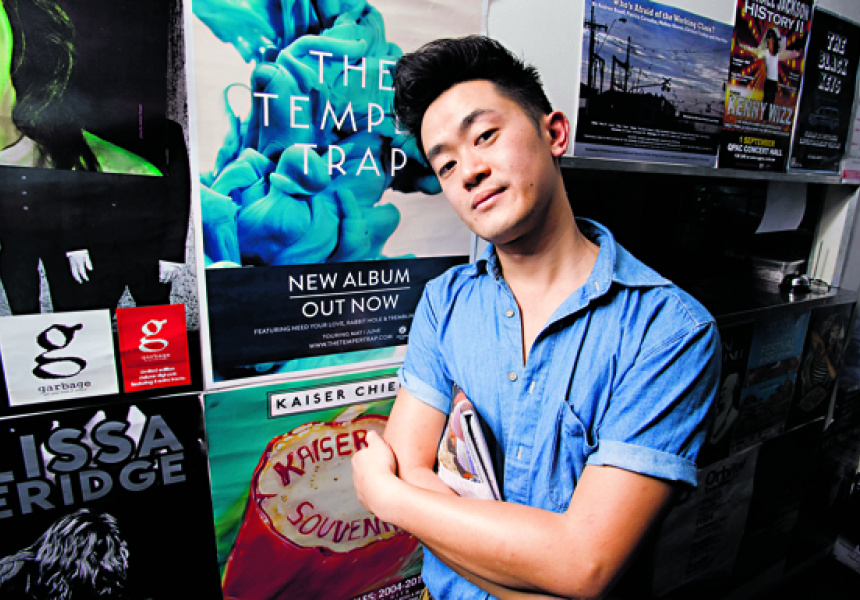Camille Gower: You’re living the dream, a successful writer in Brisbane with two published novels and contributions to some of Australia’s most admired publications. Was there a time in your life when you didn’t know if you could make a career of writing?
Benjamin Law: Ha! Oh man, how about, say, last year? Speak to anyone – writers or otherwise – who make a living from freelancing and they'll say the same thing: you approach every assignment like it's your last. But hell, I've been very lucky. My editors are some of the best in Australia and writing has led me to assignments where I've slept in marsupial reserves, hopped on motorcycles through the hillsides of Myanmar and gotten drunk with drag queens in Tokyo. It's a great job. There's no such thing as boredom. When writing goes well, it's a Champagne life. You travel around the world and you never stop learning. When you're not having a great week though (writers' block, never-ending paperwork, screwing up a story somehow), you'll more or less want to self-immolate.
CG: Your last novel Gaysia saw you travelling across a continent in search of very personal stories. Did you feel out of your comfort zone at all? Do you thrive on that feeling?
We think you might like Access. For $12 a month, join our membership program to stay in the know.
SIGN UPBL: As much as Gaysia is a book about seven different queer issues (sex tourism, transsexualism, sham marriages, queer pop culture, religious conversion therapies, HIV, gay rights movements) through seven different countries, you're right – ultimately it's a book about people's lives. It can be challenging trying to have intimate, honest conversations with someone through a translator, but most of the time, they're keen to talk. They're there to tell you things very few others seem to want to hear. It's a cliché: journalists and non-fiction writers often talk about how it's a privilege to have people share their stories with you, but it truly is. I'm not sure if you could describe having those conversations as having anything to do with comfort zones, necessarily. Whether it was someone trying to cure themselves of homosexuality or an HIV-positive sex worker, once you're talking to them, it's not difficult to empathise.
CG: Your writing is witty, humorous and at times very raw, drawing on a lot of your personal life. Do you find it hard to be an honest writer, or revel in the vulnerability of that?
BL: Between you and me, I'm not even sure I'm even that revealing, to be honest! Especially with my first book The Family Law, a lot of people were shocked by how I included my mum's descriptions of what happened to her vagina during and after childbirth. And then they meet my mother, who can't stop talking about her what happened to her vagina during childbirth, often to complete strangers, and then it all makes sense. At the same time though, I think some the strongest writing out there – and the writing that completely kills me – is where the writer shows their vulnerabilities, emotional or intellectual. In long-form non-fiction for instance, I think self-doubt is a seriously underrated virtue.
CG: Would you say it is important to find your niche in writing, or do you think it is not a good idea to limit yourself?
BL: When I teach students non-fiction writing and we workshop "how to get ideas", I ask them to list two things: (1) subjects on which they're more or less experts (parenting, specific sports, music genres, good make-up application, whatever); and (2) subjects they know nothing about, but completely fascinates them (religion, baking, S&M, whatever). Then I tell them they can write about the lot. Some people think it's important to brand yourself as a writer by having a niche or a shtick, but wouldn't it be more interesting to have a dozen shticks? A billion things you'd like to write about? For me a least, a lot of the reason why I write about politics and farts and babies and sexuality and sport and drugs and travel and race and gadgets and whatever is because I'd be bored doing the same thing, over and over.
CG: Were there any mistakes you made, when starting out, that you would warn young writers to be careful of?
BL: All I'll say is make sure your Dictaphone is actually working before you record an interview. Save yourself hours of tears, kids.

